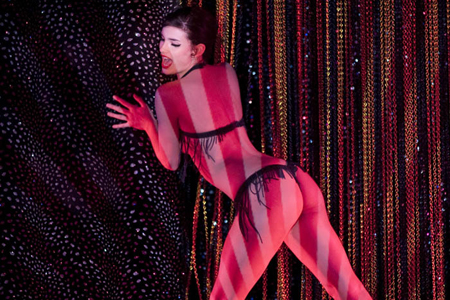Controversy in Montreal over RIDM opener ‘Crazy Horse’

UPDATED — The Montreal International Documentary Festival (RIDM) has defended itself against charges of supporting sexism after receiving a letter, signed by some 30 documentary filmmakers, protesting the choice of Frederick Wiseman’s Crazy Horse (pictured) as this year’s opening film.
Crazy Horse sees the 81-year-old director capturing the rehearsals and performances for a new show taking place at the iconic Parisian establishment, which has billed itself as offering “the best nude dancing show in the world” since 1951.
As previously reported, the film was chosen to kick off proceedings on Nov. 9, with the festival – which is still underway – also showing a 10-film retrospective of Wiseman’s work.
However, the decision has ignited a controversy within the Montreal documentary community, with some 30 directors signing a letter which argues that, among other things, the film’s vérité approach to documenting the establishment’s dancers makes it complicit in their “exploitation.” The letter also charges that the film is “boring,” and was not an appropriate choice to open a festival.
The letter was spearheaded by director Sophie Bissonnette, whose credits include NFB-backed docs Sexy Inc. – Our Children under Influence and A Vision in the Darkness, and signed by directors including Magnus Isacsson (Power, Uranium).
Talking to realscreen, RIDM’s director of programming Charlotte Selb defended the choice of the film as fest opener and said that she was surprised by the controversy, given that it had already played more or less without issue at festivals including Venice, Toronto and Doc Lisboa, the latter of which also chose it for its opening film.
Selb said the festival’s organizers have invited all of the filmmakers to an open discussion after the event finishes, to discuss the issues raised in the letter. “We also invited all the people who signed the letter to attend the masterclass Frederick Wiseman had at the festival, but none of them attended,” she added.
She said that nine of the 30 or so directors who signed the letter have not seen the film yet, and added that many directors and filmmakers had also got in touch to throw their support behind the festival and its choice of opener.
“For us it’s really, really important to make clear that we don’t see this as a sexist film,” she said. Pointing out that one of the charges in the letter was that the 134-minute film does not feature much talking from the women featured in it, she responded: “Wiseman said since he was filming them in a work environment, most of them were naturally not very talkative – they were there to dance.
“He said that if he could, he would have had more moments of them talking in the film.”
Selb acknowledged that the doc was “an audacious choice” of opening film only in as much as it was a Wiseman film, with a two and a quarter hour running time and little in the way of exposition. “We can understand that some people find it boring,” she said; however, she added that Wiseman was an important filmmaker with a career as a doc-maker that stretches over more than 40 years.
Talking to realscreen earlier this year, Wiseman himself said the dancers at the establishment “were extremely receptive to the idea” of making a documentary, and said there had been “no political problems” during the shoot.
RIDM wraps this coming Sunday.
UPDATE: RIDM has issued a letter in response to the controversy, signed by Selb as well as Mila Aung-Thwin, chair of the RIDM board of directors; Roxanne Sayegh, executive director; and Bruno Dequen, associate programmer. Within the letter, the team says that after seeing Crazy Horse, “we chose it as the opening film, as it would also allow us to highlight the [Frederick Wiseman]retrospective. The choice of the film was also a cinematic stance and was in no way intended to perpetuate the any exploitation of the female body for the purpose of broadening the RIDM’s audience. Indeed, if we had seen this documentary as moot, poorly made or unworthy of RIDM’s mission, we would have never honored it on opening night.”
The team adds: “It is important for us to highlight that the mission of the festival is to offer a selection of cinematographic works that propose themes, concerns and aesthetic approaches that are different and challenging. A selection that is not just an open door to all excesses, but rather the result of a strong editorial line based on the real expertise of its programming team.”
From realscreen.

 The definitive CDN broadcast and production resource.
The definitive CDN broadcast and production resource.










